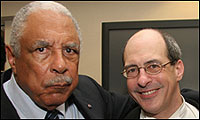[Once in a while unexpected items from the past turn up in a somewhat related Google search. Because this blog is really a catchall scrapbook as much as anything, from time to time I save such things here.]
T.J. Anderson with Atlanta Symphony Orchestra Conductor, Robert Spano
Dr. Thomas Jefferson Anderson’s music is frequently concerned with the African-American experience. His operas include Soldier Boy, Soldier, based on the writings of Leon Forrest… Walker, about black anti-slavery activist David Walker… and Slip Knot, about the execution of a slave in Massachusetts in 1768. His orchestration of Scott Joplin’s Treemonisha, the first opera written by an African-American composer, led to the work’s first fully staged performances by the Atlanta Symphony Orchestra and Morehouse College, under Robert Shaw’s baton.
In 2002, commissioned by the Cantata Singers of Boston, Anderson composed the oratorio “Slavery Documents 2,” based on public documents of American slaves and slaveholders. The work is conceived as a companion to Donald Sur’s “Slavery Documents,” which the Cantata Singers premiered in 1990. Drawing material from Loren Schweininger’s collection The Southern Debate Over Slavery, the composer asked himself, “Why would anyone want to write a composition about slavery at the beginning of the 21st century?” His answer: “There is now a recognition that racism in America has its foundation in slavery, and we as Americans must address the remaining issues.”
In a program note for the 2002 premiere, Marilyn Richardson wrote, “The resulting libretto incorporates petitions for justice, laments keened in response to unspeakable physical and psychological violence, the defiant words of fugitives acting against all but impossible odds to claim the right to their own lives, and transcendent expressions of deliverance.”
Hear excerpts: Slavery Documents
<<<<<<<<>>>>>>>>
Marilyn Richardson on
Donald Sur’s “Slavery Documents”
Notions of the separation of church and state notwithstanding, such status as a slave in this nation might have had as a Christian among Christians was implacably defined and superseded by his status as chattel. Protestant divines trod a tortuous and chilly path on the matter, debating the fine points of whether blacks might or might not possess immortal souls, while keeping a weather eye out for the off-chance that The Almighty might take a broader view of things and welcome all the righteous, without distinction, into the fellowship of the hereafter.
The vicious irony of this carefully rationalized system, a pathological mix of fear, sadism, and petty willfulness, spawned by economic expediency, drives Donald Sur’s brilliant libretto for Slavery Documents. This many-layered text, whose facets gleam with angles of meaning as they are turned in the mind and through the music, is a model of indicting the guilty parties with their own words.
In setting the grating smugness of Grayson’s pro-slavery propaganda piece, much admired in certain circles in its day, against the infamous classified advertisements placed by slaveowners attempting to reclaim their property, Sur establishes a link with a strong element of African American musical tradition, both religious and secular, that is the capacity to enunciate the raw integrity of a given theme.
It is the particular burden and triumphant achievement of many of our finest spirituals, those compositions which W.E.B. DuBois so aptly called the Sorrow Songs, to bear perfect witness. The urgent, anguished query, “Were you there when they crucified my Lord?”; the stark imperative, “Go down, Moses”; or the jubilant affirmation, “This little light of mine, I’m gonna let it shine,” all draw us into a sense of participation in a most compelling and immediate way; at once magnifying and yet making personally accessible the power of the religious mysteries they address.
In many of the slave narratives which have come down to us, there is the recounting of a transcendent moment clearly remembered. From the depths of impossibility, a man or woman chooses resistance. It is the moment of fighting back in ways great or small; of choosing death over enslavement; the moment of flight into the unknown. It is the moment of fugue which sends the fugitive off into the night, shackled, branded, hunted, with only the north star, the drinking gourd for compass.
It is through the evocation of such moments that Donald Sur’s monumental and impassioned oratorio shows us, in an age when we have yet to resolve the import of this aspect of our collective history, that there is no disgrace in having been enslaved. The history of slavery in America, from its inception, is a history of resistance, rebellion, and flight. Such disgrace as must be borne falls to those who presumed to claim ownership of another human being.
Program note, world premiere performance, Symphony Hall, Boston, MA, 1990


